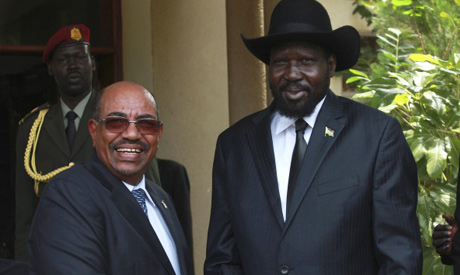Sudanese President Omar al-Bashir met Tuesday with his southern counterpart Salva Kiir amid pressure to strike a deal on the disputed Abyei region and other issues left unresolved since South Sudan won independence
Sudanese President Omar al-Bashir met Tuesday with his southern counterpart Salva Kiir amid pressure to strike a deal on the disputed Abyei region and other issues left unresolved since South Sudan won independence.
 Bashir was welcomed at the airport in Juba by Kiir, with the former arch-enemies first shaking hands and then embracing warmly. "The meeting is about building relationships between our countries, to strengthen our ties," South Sudan's Foreign Minister Barnaba Marial Benjamin told reporters as the presidents left for closed-door meetings.
Bashir was welcomed at the airport in Juba by Kiir, with the former arch-enemies first shaking hands and then embracing warmly. "The meeting is about building relationships between our countries, to strengthen our ties," South Sudan's Foreign Minister Barnaba Marial Benjamin told reporters as the presidents left for closed-door meetings.
As Bashir arrived, a military guard of honor stood to attention, comprising former rebel fighters he once battled during the two-decade civil war that led to South Sudan's independence in July 2011.
The African Union has urged the leaders to "seize the opportunity" towards settling the dispute over war-ravaged Abyei, wedged between the two countries and claimed by both sides.
Abyei was meant to vote on whether to be part of Sudan or South Sudan in January 2011 -- the same day as Juba voted overwhelmingly to split from the north -- as part of the 2005 peace deal which ended Sudan's civil war. But a referendum to decide the region's fate has been repeatedly stalled, with residents now saying they will organise their own vote to determine their fate.
The United Nations and AU have warned that any such unilateral move could inflame tensions in the oil-producing zone and risk destabilising the uneasy peace between the longtime foes.
Sudan's Foreign Minister Ali Ahmed Karti, in a statement on state news agency SUNA, said the talks would "stave off the fear" that the dispute over Abyei would endanger the "improving relations between the two countries". But many are gloomy for a quick resolution.
"I think there isn't a solution in sight for quite a long time," a Western diplomat said, but added there was a need at least to show some progress "otherwise people get desperate."